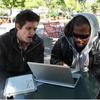PJ Vogt appears in the following:
Should War Crimes In Video Games Be Punished?
Friday, October 04, 2013
The Red Cross wants video games to punish players who commit war crimes. And their case for why is actually pretty reasonable.
TLDR #3 - JOKES.TXT
Thursday, October 03, 2013
Daniel Drucker's father died earlier this year. Daniel was excavating stuff on his Dad's computer when he found a file called JOKES.TXT. It was filled with thirty one punchlines to jokes, but not the jokes themselves. So he turned to the internet for help.
The Owner of An Encrypted Email Service Says "No" to the FBI (In a tiny, tiny font)
Thursday, October 03, 2013
Yesterday, a federal judge unsealed records from the case of Lavabit, the privacy-first email service used by Edward Snowden, versus the government. It's a compelling read, and it's a rare story because it shows a company refusing to comply with demands to give up a customer's privacy.
Ross Ulbricht, Who Allegedly Ran the World's Largest Online Drug Market, Arrested By the FBI
Wednesday, October 02, 2013
Since 2011, the Silk Road has been the most popular place to buy drugs online. Despite being very well-known, it operated with impunity up until last night, when the FBI arrested 29-year-old Ross William Ulbricht, who they say ran it. Krebs Security posted the complaint against Ulbricht, which alleges that the site's generated around 1.2 billion dollars in sales in its lifetime. The FBI also alleges that Ulbricht tried to arrange the murder of a user named FriendlyChemist who wanted $500,000 in exchange for not revealing the identities of Silk Road users.
For its users, Silk Road seemed to promise a way to buy and sell drugs with less risk. Users accessed the site via TOR-anonymized connections, and purchases were made exclusively in Bitcoin. In this case, human error, rather than technological error, brought Ulbricht down. According to the FBI, Ulbricht gave himself away by being sloppy. For instance, he used his own Gmail address on a forum where he was trying to gin up interest in the Silk Road during the early days of the site.
People are scouring Ulbricht's digital trail in the wake of the address, particularly since the FBI included a specific reference to a manifesto on Ulbricht's LinkedIn page:
I want to use economic theory as a means to abolish the use of coercion and agression amongst mankind. Just as slavery has been abolished most everywhere, I believe violence, coercion and all forms of force by one person over another can come to an end. The most widespread and systemic use of force is amongst institutions and governments, so this is my current point of effort. The best way to change a government is to change the minds of the governed, however. To that end, I am creating an economic simulation to give people a first-hand experience of what it would be like to live in a world without the systemic use of force.
His Facebook page is also still up, if you feel like doing some relatively prosaic rubbernecking.
California Bans Revenge Porn
Wednesday, October 02, 2013
Last night, California Governor Jerry Brown signed into law a bill that makes revenge porn illegal. Typically, attempts by well-meaning lawmakers to legislate the internet don't end well. These laws often end up restricting free speech without actually stopping the activity they're meant to. But if you're going to pass a law like this, California's looks pretty good.
Healthcare.Gov is Up and (Mostly) Running
Tuesday, October 01, 2013
Healthcare.gov launched today. Users can log on to find out what kind of healthcare they're eligible for. One million people visited the site before 7AM today, which is mind-boggling, considering it launched at midnight. Two quick thoughts!
1. Conservatives who are touting the site's glitches as a synecdoche for Obamacare's failure sound very silly. It's impossible to roll out something as enormous and unprecedented as healthcare.gov without glitches. For perspective, when Apple released iOS 7 last month, there were bugs and delays. When Rockstar Games released Grand Theft Auto V, they had to delay its multiplayer component for two weeks because they couldn't get up to server capacity in time. These are two tech companies who, every few years, drop an enormous thing into the internet that everyone wants at the same time. They can't perfect that process. No one can. You just fix the problems as they arise and try to be transparent. It's just too early to say if the administration has done that.
2. Back in 2008, Candidate Obama promised he'd be a tech president. Specifically, that meant more openness, in the form of sites like data.gov. More broadly, Obama seemed to promise a government that you could interact with via nice websites instead of stacks and stacks of indecipherable paper forms. And on its face, Healthcare.gov actually looks like that promise realized. It's nice that you can learn about something as complex as your healthcare options from an interface that looks like the websites you're used to visiting every day.
And yet, healthcare.gov is launching in the midst of a government shutdown. The Twitter accounts for all these federally-funded organizations are dutifully reporting that they can't tweet anymore, since the people who are paid to tweet from those accounts cannot legally do so until the budget is restored. I'm not sure what I'm getting at, exactly, except that the contrast is striking. There's a limit to what technology can fix, and the messiness of political intransigence is beyond it.
We're sorry, but we will not be tweeting or responding to @ replies during the government shutdown. We'll be back as soon as possible!
— CDC STD (@CDCSTD) October 1, 2013
The Great Airline Device Ban May End Soon
Tuesday, October 01, 2013
Airline travel abounds with absurd rules. One of the more annoying ones dictates that you have to turn off your computer, tablet, phone, etc during take-off and landing. The science supporting the idea that your Kindle could bring down a 747 has always been questionable, but the rule has stayed.
Last year, the FAA asked an advisory panel to recommend if this lunacy should, maybe, end. And this week, the advisory panel returned with their recommendations, which it's now up to the FAA to (hopefully) implement. The panel outlines a future where you can use your laptop or tablet or iPhone, you just have to put it in airplane mode under 10,000 feet. And they don't want to allow voice calls, thank god.
Possibly the best sidenote to this story comes from the New York Times, who quotes Amazon rep Drew Herdener. " “We’ve been fighting for our customers on this issue for years — testing an airplane packed full of Kindles, working with the F.A.A., and serving as the device manufacturer on this committee.”
Airplanes packed full of Kindles! How great is that? Also, if you were the pilot, don't you think you would've been just a tiny bit scared that the devices were, in fact, going to interfere?
Assistant Principal Loses Lawsuit Against Students Who Teased Him On Facebook
Monday, September 30, 2013
Adam Matot is an Assistant Principal in Oregon. Last summer, he was arrested for allegedly leaving the scene of an accident while driving under the influence. Some of his students created a parody Facebook account mocking him, and he filed a lawsuit against them under the Computer Fraud and Abuse Act, arguing that they'd damaged his reputation by impersonating him online.
This week, the case was dismissed. The judge ruled that parody Facebook accounts aren't illegal. Or at least this one isn't. Here's Venkat Balasubramani, from the Technology & Marketing Law Blog:
Reviewing the CFAA case law, the court says that plaintiff’s cause of action is premised on defendants’ use of protected computers beyond the scope of authorization (i.e., use in a way that “exceeded authorized access”). Finding that Nosal, Brekka, and US v. Drew all frowned upon this as a legal theory (particularly when restrictions are contained in terms of use agreements), the court rejects the claim.
Middle schoolers of the world, please continue to tease your administrators online.
Goodbye, Breaking Bad
Monday, September 30, 2013
Breaking Bad ended last night. An estimated 8 million people tuned in to watch the show end, which I bet undercounts all the folks downloading it two hours later from a torrent, or who watched it from a crowded bar or a friend's couch.
Today, on our last post-Breaking Bad Monday, I'm realizing what I'll miss most about the show isn't the show itself, but the way it reigned in and focused our cultural attention. Breaking Bad cross-pollinated every cultural channel I pay attention to.
This week of lies is over. Happy Friday!
Friday, September 27, 2013
What a strange week it's been. We found out our favorite spambot was an art project. Kanye West, furious about a Jimmy Kimmel sketch, tweeted a Slate article. Last night, I saw a dog on the train doing a very good impression of a sleepy, home-bound commuter.
Why You Should Let Google Spy On You (Sometimes)
Friday, September 27, 2013
Google turned 15 today. The company celebrated by unveiling a new version of their algorithm. Meanwhile, a judge issued a ruling that a class-action suit that against Google's targeted ads can proceed.
TLDR #1.5 - The Bonkers Conclusion of Pronunciation Book
Thursday, September 26, 2013
Consider this a mini-episode. The final update to episode 1 of TLDR. We all found out on Monday that Pronunciation Book (along with the Twitter account horse_ebooks) were part of a collaborative stunt between Jacob Bakkila and Thomas Bender to promote their art project Alternate Reality Game, Bear Stearns Bravo. The Daily Dot's Gaby Dunn, who we spoke to for our original story, figured out that Bakkila was the guy behind Pronunciation Book months ago. In order to convince her not to publish her story, Bakkila manipulated Dunn with a very elaborate series of lies. Weirdly, many of the people in her life were in on those lies, in varying capacities. We did a follow-up interview with Gaby about living her own personal version of the Truman Show, and you should listen because it is bonkers.
New York Programmer Teaches A Homeless Man To Code
Thursday, September 26, 2013
Last month, Twenty-three year old programmer Patrick McConlogue came up with a pretty audacious plan. He'd offer a homeless person a choice: A) 100 dollars, or B) a cheap laptop, some programming books, and free coding lessons from McConlogue. McConologue's naive-sounding tone rubbed people the wrong way. Snarky things were written. But today, McConlogue told Business Insider that a few weeks in, the plan's going along pretty well. Leo, the homeless man he's working with, chose the lessons over the money, and he says he's learned a lot. Business Insider's video profile after the jump.
#1.5 - The Bonkers Conclusion to Pronunciation Book
Wednesday, September 25, 2013
Someone Lost Millions of Dollars Betting On Mitt Romney Last Year
Wednesday, September 25, 2013
In the run-up to the 2012 Presidential election, there was a lot of talk about prediction markets -- websites where people can bet online about the outcome of any given event. They're useful because they give outsiders a snapshot of what the crowd thinks is going to happen. They're also, in theory, vulnerable to manipulation. If someone were willing to buy tons of stock in an idea they support, they could make it look like a lot of people believe in it too. But no one would really do that. Because it'd be crazy and expensive. Right? From the Wall Street Journal:
"...A single trader lost between $4 million and $7 million placing a flurry of Intrade bets on Mitt Romney—perhaps to make the Republican nominee’s chance of victory appear brighter.
Two economists who studied the data offer various rationales for the trader’s aggressive wagering on Mr. Romney in the final two weeks of the campaign. The anonymous trader placed 1.2 million pro-Romney contracts, some of which were actually in the form of bets against a Barack Obama victory.
The most plausible reason for the betting, the authors conclude, is that “this trader could have been attempting to manipulate beliefs about the odds of victory in an attempt to boost fundraising, campaign morale, and turnout.”
Oof. I never thought I'd feel so much sympathy for an anonymous tycoon.
The War On Bad Commenters
Wednesday, September 25, 2013
It's strange what you can get used to. Since its inception, we've all mostly agreed that it's normal for YouTube's comments section to be a maw of hateful idiocy.
Imagine if, in the 60's, CBS had a comments crawl where racial slurs and non-sequiturs scrolled beneath whatever program you were watching. An alternate reality where, when the Beatles were playing on Ed Sullivan, underneath we got to learn that Eric201 from Cincinnati thinks that they all look like idiots or that World War 2 was an inside job.
Anyway. This week, YouTube announced they'll roll out a system meant to clean up their comments system. Commenters will still have anonymity, but a system of reputation and moderation will be exist to help mute the worst dreck. Assuming it works, or even half-works, we can look forward to a future where we're able to browse the latest Louis CK late night clips without sorting through a ton of hateful garbage on the way.
Meanwhile, over at PopSci, the editors have decided to do away with comments entirely. They're surely not the first publication to do it, but what I found charming was their rationale, which is, of course, firmly grounded in science.
...Even a fractious minority wields enough power to skew a reader's perception of a story, recent research suggests. In one study led by University of Wisconsin-Madison professor Dominique Brossard, 1,183 Americans read a fake blog post on nanotechnology and revealed in survey questions how they felt about the subject (are they wary of the benefits or supportive?). Then, through a randomly assigned condition, they read either epithet- and insult-laden comments ("If you don't see the benefits of using nanotechnology in these kinds of products, you're an idiot" ) or civil comments. The results, as Brossard and coauthor Dietram A. Scheufele wrote in a New York Times op-ed: "Uncivil comments not only polarized readers, but they often changed a participant's interpretation of the news story itself."
Two Great Internet Mysteries, Solved (Or Ruined)
Tuesday, September 24, 2013
This morning, Pronunciation Book, the ominous, apocalyptic count-downing YouTube channel, hit zero.
Why Fake Reviews Will Never, Ever Go Away
Monday, September 23, 2013
New York regulators announced today that nineteen companies would be fined $350,000 for paying for fake reviews on sites like Yelp. How'd they catch them? Regulators posed as employees at a struggling Brooklyn yogurt shop, and then called SEO firms to ask them to astroturf on their behalf. But even if every shady operator on the internet is sufficiently frightened by these fines, it's unlikely to stop the tide of fake reviews.















